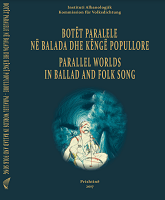PARALLEL WORLDS IN THE SOUTH ALBANIAN BALLADS OF NIZAMS
PARALLEL WORLDS IN THE SOUTH ALBANIAN BALLADS OF NIZAMS
Author(s): Lumnije Kadriu
Subject(s): Customs / Folklore, Music, Culture and social structure , 13th to 14th Centuries
Published by: Instituti Albanologjik i Prishtinës
Keywords: Parallel Words; Ballad; Nizams; Intertextuality; Recontextualization;
Summary/Abstract: Nizams were ordinary soldiers in the regular army of the Ottoman Empire who were taken from all places under its rule for mandatory service in distant countries, such as Yemen and Arabistan. As a result, a ballad subgenre was created: Ballads of Nizams. Since the Middle Ages, the Ottoman Empire conducted periodic battles with Yemen and so ballads were produced over a long time span. Because of the nature of their absence and the long distances involved, as well as difficult environmental conditions where they were sent, men often had little chance of returning alive. Thus, in these songs, mostly in the oldest versions, we find communication between Nizams and their loved ones realized metaphorically and supernaturally. Communication was not only between people in distant countries but also between different worlds, of the dead and the living. In this article, in addition to analysis of two quite popular Ballads of Nizams sung in polyphony, which is a characteristic of singing in south Albania, their re-creation and re-contextualization over time and space will also be analysed. Moreover, the analysis will include the reuse of one of the ballads by the prominent writer Ismail Kadare to interpret a painful contemporary phenomenon, that of women who in time of crisis in Albania were forced to leave the country and ended up as prostitutes abroad. Their “world” became very distant and difficult, and return was most probably impossible, both because of the social stigma and because they were considered to inhabit an “underworld”.
Book: BOTËT PARALELE NË BALADA DHE KËNGË POPULLORE
- Page Range: 421-450
- Page Count: 30
- Publication Year: 2017
- Language: English
- Content File-PDF

